
AUDI A6 Avant
Generations Timeline, Specs and Pictures
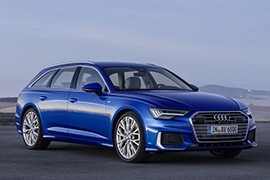
Audi unveiled the sixth generation of the A6 Avant in 2018, along with its three-box sedan brother, before the Geneva Motor Show.
The A6 Avant continued the station wagon shapes for the German premium carmaker. Even though it didn’t offer the biggest trunk in its segment, the car was able to carry more than enough luggage. Surprisingly, it didn’t offer more storage area than its predecessor, but Audi’s engineers were more focused on other areas.
Its new look was aggressive for a family station wagon but preferred by the Audi customers. It sported a singleframe grille with horizontal slats and LED headlights, and daytime running lights. Its wide side-scoops from the bumper suggested that they were used to cool the front brakes. From its sides, the A6 Avant featured an extended roof slightly sloped down toward the raked-forward tailgate. In the back, the carmaker installed standard LED taillights. Its rear bumper featured two fake wide exhausts.
Inside, Audi worked hard to keep up with the best in business carmakers. As usual, it offered a carefully crafted interior with high-quality materials and finishes. In front of the driver, the instrument cluster featured a 12.3” digital display (Audi Virtual Cockpit). On the center stack, the carmaker introduced a newly developed MMI (Multi Media Interface) with an up to 10.1” touch screen.
Under the hood, the biggest surprise was the mild-hybrid version, which allowed the big vehicle to coast with the engine shut off at speeds between 55 and 160 kph (34 – 99 mph). In total, Audi offered a choice of eight engines with front or all-wheel-drive systems.

Revamped for 2014, the new Audi Avant delivered more fuel efficiency, more power and featured a new, classy updated exterior design.
Featuring a sharper design, the new A6 Avant had new headlamps and taillights, as well as refreshed bumpers and a new grille.
Inside, the interior featured the same stylish sweeping dash and lots of storage spaces, including cupholders, a large glovebox and decently sized door bins.
Spaciousness was one of the Avant’s strongest points, offering a larger cargo area than the already roomy A6 sedan. With the seats folded down, the A6 could easily carry even furniture, with the enormous space available.
The rear cabin was roomy even for the tallest occupants, with great headroom and good legroom.
With the quiet cabin, the refined engines and the incredibly comfortable seats, the Audi A6 Avant made a great companion for motorway driving and long distances. The suspension absorbed almost every bump on the road.
Besides the luxurious features available, as well as the increased comfort offered, the new model came with a range of engines that offered great fuel consumption and power.
Even the most powerful 3.0-liter diesel unit with 218 hp developed wasn’t that thirsty. Other less frugal engines were also available, including gasoline powerplants.
If worried about winter and snowfall, the model was available with Audi’s Quattro system that enhanced the already grippy handling.
Fully loaded, the Audi A6 Avant could had been a little pricey.

In 2011, at the time of its launch, the A6 Avant was the most successful premium station wagon in Europe in its segment.
The 4.93 m long vehicle (16.2 ft) was able to carry up to 1680 liters (59.33 cu ft) by folding down the rear seat backs. The regular trunk, without folding anything, was 565 liters (19.95 cu ft), which was still impressive. As an option, the A6 can be equipped with a sensor under the rear bumper that can detect a foot movement and opens automatically the liftgate. The interior is big, due to its long wheelbase of 2.91 meters (9.55 ft).
The Audi A6 Avant is available with a choice of six engines, with gasoline or turbodiesels. All of them are featuring direct fuel injection. The base model came with a 2.0-liter TDI with 177 hp. The 3.0 V6 TDI unit is available in three outputs: 204 hp, 245 hp and the top of the range 313 hp. The latter can do a 0-100 kph (62 mph) sprint in 5.4 seconds.
For the gasoline engines, Audi offers a 2.8-liter FSI with 204 hp and a 3.0-liter TFSI supercharged producing 300 hp. Depending on the engine, the A6 Avant is offered either with front-wheel-drive or quattro (all-wheel-drive).
The 2011 A6 Avant is available with a wide range of transmissions. Depending on the engine, Audi offers a six-speed manual, the continuously variable multitronic or the S tronic with seven speeds. The 3.0 TDI with 230 kW (313 hp) delivers its power to an eight-speed tiptronic
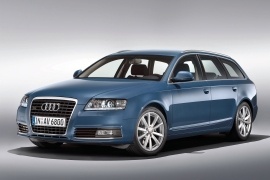
The third generation of the mid-size Audi lineup was proof that it could sit at the same table with BMW and Mercedes-Benz.
Dressed as a station wagon, it was even better.
Audi started its growth into the premium segment in the late ’70s and the beginning of the ’80s. It took it more than two decades to convince the customers that it deserves the same respect as the other two premium German carmakers. For a while, it offered its mid-size vehicles in three body shapes: sedan, hatchback, and station wagon. After introducing the A6, it dropped the middle version. Audi unveiled the third generation of the A6 in 2004 and refreshed it in 2008.
From the outside, the 2008 A6 visual appeal was increased with the S-line exterior trim package being added to the new generation, with updates including a new grille and a new bumper, as well as a rear diffuser and 18-inch alloy wheels. To complete the sporty exterior, a customer wanting added sportiness to the interior could add the S-line interior package that included sport seats and a 3-spoke steering wheel.
Inside, the carmaker offered a comfortable and roomy interior fit for five full-grown adults. The rear bench was split-folding and could expand the trunk space from 565 liters (20 cu-ft) to a massive 1660 liters (58.6 cu-ft). The dashboard featured an extended instrument cluster over the center console and included a new infotainment system.
Under the hood, Audi installed a very comprehensive choice of engines, both diesel, and gasoline. It offered something for everyone, from a fuel-efficient 2.0 TDI engine with front-wheel-drive to the Porsche-killer RS6 Avant fitted with a 576 hp V10 engine.
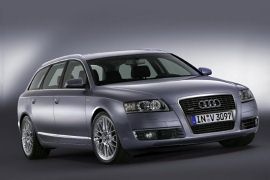
The station-wagon version of the third generation for the Audi A6 offered more room in the back for luggage but, more important, more headroom for the rear-seat occupants.
The launch of the third generation of the Audi A6 was a success. The car was praised and it was a true competitor for the other two German premium car-makers, BMW and Mercedes-Benz with their 5-Series and E-Class. But Audi made another move in 2005 and it showed the station-wagon version, named Avant as any other estate car made by it.
The A6 Avant was longer and taller than the standard, three-box sedan, A6. Its size made it a very comfortable cruiser and the design made helped it gain attention from the customers. By the A-pillars, the car looked similar to the regular A6, but from the A-pillars toward the end, everything was changed. The extended roof allowed more headroom for the rear passengers and it was available with roof-rails. In the back, the raked tailgate covered a respectably sized trunk. It was available with electric opening, like the latest E-Class T-Model, but its rear window didn’t open independently like in the BMW 5-Series Touring.
Inside, the rear bench was split-folding. The trunk offered 565 liters (20 cu-ft) of space and it could have been extended up to 1660 liters (58.6 cu-ft), which was a lot by any standards. The distance between the wheel-wells inside the trunk area was more than a meter (39.3”) wide.
Under the hood, the A6 Avant was offered with a choice of gasoline and diesel units. An air-suspension developed for the cross-over version, named A6 Allroad, was available for the regular station-wagon, but it was mostly used to keep the car’s ground clearance if the vehicle was loaded.
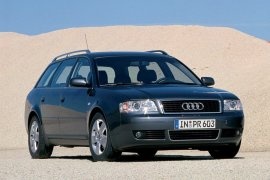
The 1998 generation Audi A6 received its first - and only - facelift in 2001.
Apart from the redesigned lines (including revised headlights, a newly-developed front grille and redesigned exhaust system) the new A6 Avant was equipped with an innovative multitronic continuously variable transmission (for front-wheel-drive models) and optional ‘quattro’ permanent all-wheel-drive system for most models. Some of the engines were modified and received extra horsepower, while the 1.8L unit was replaced by a new 130 HP 2.0L engine. It was discontinued in 2004, with the introduction of a new generation A6 model.
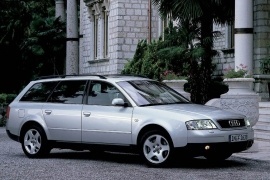
Audi introduced the station wagon version of the A6 in 1998, a year later than its three-box sedan sibling.
The second generation of the A6 was designed on an entirely new platform, unlike its predecessor, which used the same base as the 1990 Audi 100. It could finally compete against its main rivals, the BMW 5 Series and the Mercedes-Benz E-Class. But the carmaker didn’t rely only on the vehicle’s size to sit at the same table with the other two German premium carmakers. It packed the car with technology and the Quattro all-wheel-drive system. The station-wagon version, named Avant, provided more trunk space than the 5 Series Touring but less than the E-Class T-Model, respectively.
At the front, the A6 Avant featured the same front fascia as its sedan sibling, with sharp-looking headlights which featured corner-mounted, clear turn signals. The carmaker added a chromed surrounding to the hood-mounted grille in the middle, while the bumper sported a black, unpainted area on the lower side. The A6 Avant revealed its extended roofline and the additional side window installed behind the rear doors from its profile. A raked-forward tailgate resembled the shape of older Audi 100 Avant models but less inclined.
Inside, Audi installed a wide cabin fit for five full-grown adults. It provided comfortable bucket seats, and the carmaker spoiled the driver with various options, including heated seats. The rear 60/40 split-folding bench increased the trunk size when lowered, from 455 liters (16 cu-ft) up to 1,590 liters (56.1 cu-ft).
Audi offered the A6 a wide choice of engines ranging between a 1.8-liter, 125 hp (carried over from the A3 compact sibling) and a twin-turbocharged, 2.7-liter powerplant that produced 230 hp. Later on, the carmaker added more versions, including an outrageous 4.2-liter V-8 carried over from the flagship model, the A8.
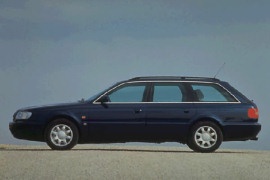
The first generation of the Audi A6 was based on the last generation of the Audi 100.
It was the facelift for the latter with the new name.
The middle-sized Audi was based on te C4 platform and it was designed to tackle the premium car market on both sides of the Atlantic. Strangely, the UK was the first country to receive the new A6, since they ran out of the former Audi 100 stocks.
The facelift was a success. The small changes on the outside paid off. The new headlights and taillights were a success. The special shape of the bumpers was adopted to lower the drag coefficient. New 16” light-alloy wheels were available, depending on the engine and trim version.
Inside, the A6 offered room for five and comfort for all of them. Amenities such as radio-cassette with a 10-CD CD-changer was something new for the market. The heated seats and automatic climate control was available as well. For the trunk space, the A6 offered an Avant (station wagon) version. With the rear seats up, it could get up to 390 liters (13.8 cu-ft) of space and up to 1310 liters (46.3 cu-ft) with the rear seats folded.
The standard transmission was a 5- or 6-speed manual, while some versions could have been equipped with a 4-speed automatic. For some versions, the quattro all-wheel-drive system was available, via a Torsen center differential.























































